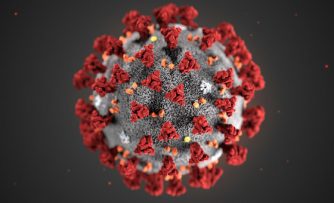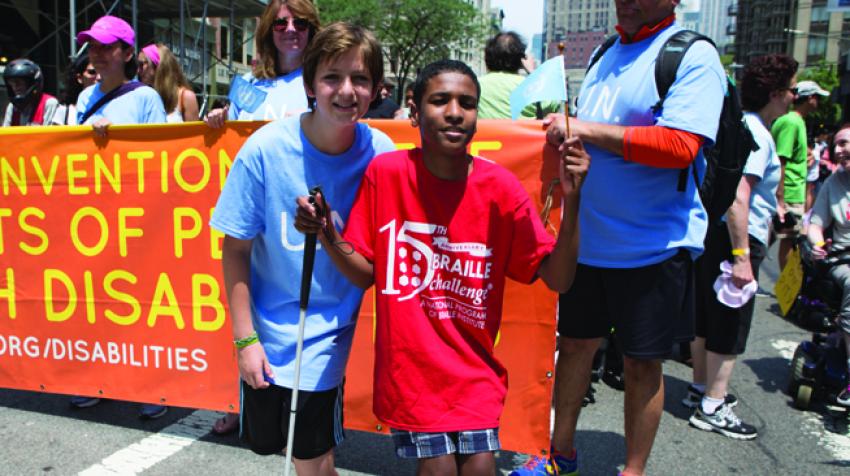Persons with disabilities generally have more health-care needs than others – both standard needs and needs linked to impairments – and are therefore more vulnerable to the impact of low quality or inaccessible health-care services than others. Compared to persons without disabilities, persons with disabilities are more likely to have poor health: among 43 countries, 42 per cent of persons with disabilities versus 6 per cent of persons without disabilities perceive their health as poor.
To achieve the highest attainable standard of health for persons with disabilities, the following actions should be considered:
- Strengthen national legislation and policies on health care in line with the CRPD.
- Identify and eliminate obstacles and barriers to accessibility in health-care facilities.
- Improve health-care coverage and affordability for persons with disabilities as part of universal approaches to health care.
- Train health-care personnel on disability inclusion and improve service delivery for persons with disabilities.
- Empower persons with disabilities to take control over their own health-care decisions, on the basis of informed consent.
- Prohibit discriminatory practices in health insurance and promote health insurance coverage for assistive products and rehabilitation services.
- Improve research and data to monitor, evaluate and strengthen health systems to include and deliver for persons with disabilities.
While having a disability probably doesn’t by itself put someone at higher risk from Coronavirus, many persons with disabilities do have specific underlying conditions that make the disease more dangerous for them.
Over 100 disability advocacy organizations and a coalition of disability rights and emergency management experts in the host country recently made an urgent call for immediate response, addressing the specific needs of persons with disabilities to maintain their health, safety, dignity, and independence in the community throughout the COVID-19 outbreak and related health emergencies.
UN Flagship Report on Disability and Sustainable Development Goals
What is Coronavirus?
 Coronaviruses (CoV) are a large family of viruses that cause illness ranging from the common cold to more severe diseases such as Middle East Respiratory Syndrome (MERS-CoV) and Severe Acute Respiratory Syndrome (SARS-CoV). Coronavirus disease (COVID-19) is a new strain that was discovered in 2019 and has not been previously identified in humans.
Coronaviruses (CoV) are a large family of viruses that cause illness ranging from the common cold to more severe diseases such as Middle East Respiratory Syndrome (MERS-CoV) and Severe Acute Respiratory Syndrome (SARS-CoV). Coronavirus disease (COVID-19) is a new strain that was discovered in 2019 and has not been previously identified in humans.
Coronaviruses are zoonotic, meaning they are transmitted between animals and people. Detailed investigations found that SARS-CoV was transmitted from civet cats to humans and MERS-CoV from dromedary camels to humans. Several known coronaviruses are circulating in animals that have not yet infected humans.
Common signs of infection include respiratory symptoms, fever, cough, shortness of breath and breathing difficulties. In more severe cases, infection can cause pneumonia, severe acute respiratory syndrome, kidney failure and even death.
Standard recommendations to prevent infection spread include regular hand washing, covering mouth and nose when coughing and sneezing, thoroughly cooking meat and eggs. Avoid close contact with anyone showing symptoms of respiratory illness such as coughing and sneezing.
“We must guarantee the equal rights of people with disabilities to access healthcare and lifesaving procedures during the pandemic.”
UN Secretary-General António Guterres at the launch of Policy Brief on Persons with Disabilities and COVID-19 –
6 May 2020.
WHO: Coronavirus disease (COVID-19) outbreak
This web page brings together information and guidance from the World Health Organization (WHO) and the United Nations regarding the current outbreak of novel coronavirus (2019-nCoV) that was first reported in Wuhan, China, on 31 December 2019. Please visit this page for daily updates. WHO is working closely with global experts, governments and partners to rapidly expand scientific knowledge on this new virus, to track the spread and virulence of the virus, and to provide advice to countries and individuals on measures to protect health and prevent the spread of this outbreak. Learn more about Resources on Coronavirus disease (COVID-19) Pandemic by WHO.
UN Common Agenda
Our Common Agenda is the Secretary-General's vision for the future of global cooperation. It calls for inclusive, networked, and effective multilateralism to better respond and deliver for the people and planet and to get the world back on track by turbocharging action on the Sustainable Development Goals. It outlines possible solutions to address the gaps and risks that have emerged since 2015, calling for a Summit of the Future that will be held in 2024.
Learn more: https://www.un.org/en/common-agenda
UN Resources on Persons with Disabilities and COVID19
- 2023 SDG Summit
- A Disability-Inclusive Response to COVID-19 – UN Response
- The Impact of COVID-19 on Older Persons in the Arab Region by UNESCWA
- People with disabilities in the face of COVID-19 in the Americas and the Caribbean by UNDRR
- Persons with disabilities in the COVID-19 response: Ensuring the inclusion of persons with disabilities at all stages of the response by ILO
- Rapid Assessment of the Socio-economic impact of COVID-19 on persons with disabilities in Vietnam by UNDP
- Joint Statement “Local governments and persons with disabilities in relation to Covid-19 by the Special Envoy of the UN Secretary General on Disability and Accessibility | English | Español
- Joint statement in support of the Secretary General’s Policy Brief on a disability-inclusive response to COVID-19
- UN DESA Policy Brief on "Old age inequality begins at birth: life course influences on late-life disability"
- UN DESA Policy Brief on “Leaving no one behind: the COVID-19 crisis through the disability and gender lens”
- UN Secretary-General’s Policy Brief: COVID-19 and Human Rights: We are all in this together
- UN DESA’s web portal on COVID-19 to closely monitor the economic, financial and social impacts of the crisis and help Member States navigate the policy choices ahead in a way that leaves no one behind.
- Report on “Shared Responsibility, Global Solidarity: Responding to the socio-economic impacts of COVID-19
- The Secretary-General’s UN Response and Recovery Fund
- Disability considerations during the COVID-19 outbreak by WHO
- COVID-19: Who is protecting the people with disabilities? by Ms. Catalina Devandas, Special Rapporteur on the rights of persons with disabilities
- Preventing discrimination against people with disabilities in COVID-19 response by UN News
- COVID-19: How to include marginalized and vulnerable people in risk communication and community engagement by UN Women
- The COVID-19 Outbreak and Gender:Key Advocacy Points from Asia and the Pacific by UN Women
- COVID-19 and the world of work by ILO
- Useful links for disability-inclusive responses to COVID-19 crisis by UNESCAP
- Joint Statement by Chair of UN CRPD and SG-Envoy on disability, 1 April
- COVID-19 response: Considerations for Children and Adults with Disabilities by UNICEF
- Risk Communication & Community Engagement for COVID-19- Engaging with Children and Adults with Disabilities by UNICEF
- IASC briefing note on addressing mental health and psychosocial aspects of COVID-19 Outbreak
- UNESCAP Policy Brief: Ensuring Disability Rights and Inclusion in the response to COVID-19
- 7 ways employers can support working parents during the coronavirus disease (COVID-19) outbreak
- The COVID-19 Outbreak and Gender: Key Advocacy Points from Asia and the Pacific by UN Women
- Disability Inclusive social protection response to COVID-19 crisis by UNPRPD, IDA and UN Special Rapporteur on the rights of persons with disabilities
- Technical Brief COVID-19: A Gender Lens – Protecting Sexual and Reproductive Health and Rights, and Promoting Gender Equality by UNFPA
- Webinar Disability Inclusion in COVID-19 responses in the World of Work by ILO
- Persons with disabilities in the COVID-19 response by ILO
- Combatting the Dual Challenge of COVID-19 and Climate-Related Disasters by UNDRR
- COVID-19 and The Rights of Persons with Disabilities: Guidance by OHCHR and related UN News here
- ITU guidelines on how to ensure that digital information, services and products are accessible by all people, including Persons with Disabilities during COVID-19
- Leaving no one behind during the pandemic: Children with disabilities and COVID-19 by UNICEF
- Life in the Times of COVID-19: A Guide for Parents of Children with Disabilities by UNESCO
- Persons with disabilities and coronavirus disease (COVID-19) in Latin America and the Caribbean: status and guidelines by UNECLAC
- Infection Prevention and Control Guidance for Long-Term Care Facilities in the context of COVID-19 by WHO
- All Means All – How to support learning for the most vulnerable children in areas of school closures by UNICEF
- IASC Key Messages on Applying IASC Guidelines on Disability in the COVID-19 Response
- The Social Challenge in times of COVID-19 by ECLAC
- Webinar Protecting and Empowering Persons with Disabilities in the Context of the COVID-19 Pandemic by ESCAP
- Webinar High-Level Meeting to Support Persons with Disabilities during COVID-19 in the Arab Region by ESCWA
- Disability inclusion in company responses to COVID-19 by ILO
- Statement on COVID-19 and the human rights of persons with disabilities by OHCHR
- Human Rights Council holds panel discussion on the rights of persons with disabilities in the context of climate change
- COVID-19 Disability Inclusive e-Health Response – African Nation Sign Language Translation Mobile Application for Pharmaceutical & Medical Services (Purple Sign) by ITU
- The need for increased digital accessibility during COVID-19 and beyond by ITU
- Public Webinar on Digital accessibility during COVID-19 by ITU
- Women with Disabilities in a Pandemic by UN Women
- Meeting basic needs of women and girls with disabilities during COVID-19 by UN Women
- Take five: As Haiti battles COVID-19, services to protect women and girls with disabilities are critical by UN Women
- Leaving no one behind in the COVID-19 response by UNDP
- Adapting the global humanitarian response to COVID-19 by UN OCHA
- Empowering students with disabilities during the COVID-19 crisis by UNESCO
- COVID-19 impact on persons with disabilities by UNFPA
- Persons with disabilities in situations of risk: A scoping study on Article 11 of the Convention on the Rights of Persons with Disabilities by UNDRR
- UN Partnership on the Rights of Persons with Disabilities: Annual Narrative and Financial Report 2021 by UNDP
- Global report on health equity for persons with disabilities by WHO
- UN Human Rights Report to the Secretary-General on implementation of the UN Disability Inclusion Strategy by OHCHR
- Disability-Inclusive Humanitarian Action Toolkit by UNICEF
- Digital inclusion of all by ITU
- UNICEF Disability Inclusion Policy and Strategy (DIPAS) 2022-2030 by UNICEF
- Digital Inclusion for Persons with Disabilities by ITU
- Guidelines on how to address disability inclusions in ESCAP evaluations by ESCAP
- Experiences of women with disabilities in the Asia-Pacific region during COVID-19 by UN Women
- Disability inclusion markers by UN Women
- Education to employment: Youth with disabilities and their needs post-COVID-19 by UNESCO
- Progress on disability rights risks going in reverse: Guterres by UN News
- UN DESA: COVID-19 laid bare barriers faced by 1 billion people with disabilities
- UN DESA: Five things you need to know about living with a disability during COVID-19
- Ensuring continuity of education of children with disabilities during emergencies by UNESCO
- Policy paper: Assessing the impact of COVID-19 on young women peacebuilders by UN Women
Resources from our Partners and Others
- An initial overview of specific social protection measures for persons with disabilities and their families in response to COVID 19 crisis by Centre for Inclusive Policy
- CRPD-Compliant COVID-19 response and recovery by IDA and IDDC
- COVID-19 response and the rights of persons with disabilities by GLAD Network
- General Statement of the GLAD Inclusive Education Working Group for COVID19 Crisis Response by GLAD Network
- COVID 19 and the disability movement by IDA
- Toward a Disability-Inclusive COVID19 Response: 10 recommendations by IDA
- Easy-to-read information about Coronavirus available in many languages by Inclusion Europe
- There is an urgent need for Government to address the rights and needs of persons with disabilities throughout all COVID-19 planning and response by Partnership for Inclusive Disaster Strategies , World Institute on Disability and National Council on Independent Living Emergency Preparedness Subcommittee
- Recommendations for policy makers by the European Disability Forum by EDF
- Recommendations for the short-term management of the pandemic, by CERMI
- Using the Washington Group Tools to Assess the Impact of COVID-19 on Persons with Disability by Washington Group on Disability Statistics
- School transportation materials for education and transport officials in a time of pandemic, by Access Exchange International
For more information about COVID-19, please visit: https://www.un.org/coronavirus
 Welcome to the United Nations
Welcome to the United Nations

